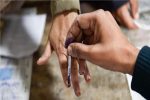
Listening to music near bedtime can be disruptive to sleep: Study
Team Udayavani, Jun 12, 2021, 1:34 PM IST

Many people are in habit of listening to music throughout their day and often near bedtime to wind down. However a new study on the relationship between music listening and sleep suggests that it actually might affect your sleep pattern.
Sleep researcher Michael Scullin, Ph.D., associate professor of psychology and neuroscience at Baylor University saw an opportunity to investigate the relationship between music listening and sleep after he himself experienced the ‘earworms’ — a phenomenon where a song or tune replays over and over in a person’s mind — while sleeping.
The findings of the study were published in the journal ‘Psychological Science’.
Scullin’s recent study investigated the relationship between music listening and sleep, focusing on a rarely-explored mechanism: involuntary musical imagery, or “earworms.”
These commonly happen while awake, but Scullin found that they also can happen while trying to sleep. “Our brains continue to process music even when none is playing, including apparently while we are asleep,” Scullin said.
Scullin added, “Everyone knows that music listening feels good. Adolescents and young adults routinely listen to music near bedtime. But sometimes you can have too much of a good thing. The more you listen to music, the more likely you are to catch an earworm that won’t go away at bedtime. When that happens, chances are your sleep is going to suffer.” People who experience earworms regularly at night — one or more times per week — are six times as likely to have poor sleep quality compared to people who rarely experience earworms. Surprisingly, the study found that some instrumental music is more likely to lead to earworms and disrupt sleep quality than lyrical music.
The study involved a survey and a laboratory experiment. The survey involved 209 participants who completed a series of surveys on sleep quality, music listening habits and earworm frequency, including how often they experienced an earworm while trying to fall asleep, waking up in the middle of the night and immediately upon waking in the morning. In the experimental study, 50 participants were brought into Scullin’s Sleep Neuroscience and Cognition Laboratory at Baylor, where the research team attempted to induce earworms to determine how it affected sleep quality.
Polysomnography — a comprehensive test and the gold standard measurement for sleep — was used to record the participants’ brain waves, heart rate, breathing and more while they slept. “Before bedtime, we played three popular and catchy songs — Taylor Swift’s ‘Shake It Off,’ Carly Rae Jepsen’s ‘Call Me Maybe’ and Journey’s ‘Don’t Stop Believin’,” Scullin said.
Scullin added, “We randomly assigned participants to listen to the original versions of those songs or the de-lyricized instrumental versions of the songs. Participants responded whether and when they experienced an earworm. Then we analyzed whether that impacted their nighttime sleep physiology. People who caught an earworm had greater difficulty falling asleep, more nighttime awakenings, and spent more time in light stages of sleep.” Additionally, EEG readings — records of electrical activity in the brain — from the experimental study were quantitatively analysed to examine physiological markers of sleep-dependent memory consolidation. Memory consolidation is the process by which temporary memories are spontaneously reactived during sleep and transformed into a more long-term form.
“We thought that people would have earworms at bedtime when they were trying to fall asleep, but we certainly didn’t know that people would report regularly waking up from sleep with an earworm. But we saw that in both the survey and experimental study,” he said. Participants who had a sleep earworm showed more slow oscillations during sleep, a marker of memory reactivation. The increase in slow oscillations was dominant over the region corresponding to the primary auditory cortex which is implicated in earworm processing when people are awake.
“Almost everyone thought music improves their sleep, but we found those who listened to more music slept worse,” Scullin said. “What was really surprising was that instrumental music led to worse sleep quality — instrumental music leads to about twice as many earworms,” Scullin added.
The study found that individuals with greater music listening habits experienced persistent earworms and a decline in sleep quality. These results are contrary to the idea of music as a hypnotic that might help sleep. Health organisations commonly recommend listening to quiet music before bedtime — recommendations that largely arise from self-reported studies. Instead, Scullin has objectively measured that the sleeping brain continues to process music for several hours, even after the music stops.
Knowing that earworms negatively affect sleep, Scullin recommended first trying to moderate music listening or taking occasional breaks if bothered by earworms. Timing of music also is important — try to avoid it before bed. “If you commonly pair listening to music while being in bed, then you’ll have that association where being in that context might trigger an earworm even when you’re not listening to music, such as when you’re trying to fall asleep,” he said.
Another way to get rid of an earworm is to engage in cognitive activity — fully focusing on a task, problem or activity helps to distract your brain from earworms. Near bedtime, rather than engaging in a demanding activity or something that would disrupt your sleep, like watching TV or playing video games, Scullin suggested spending five to 10 minutes writing out a to-do list and putting thoughts to paper. A previous study by Scullin — partially funded by a National Institutes of Health grant and the Sleep Research Society Foundation — found that participants who took five minutes to write down upcoming tasks before bed helped “offload” those worrying thoughts about the future and led to faster sleep.
With ANI Inputs
Udayavani is now on Telegram. Click here to join our channel and stay updated with the latest news.
Top News
Related Articles More

World Malaria Day: WHO calls for equitable health access

What role does genetics play in breast cancer? How can genetic testing help with early breast cancer diagnosis?

Father’s diet can affect anxiety in sons, metabolism in daughters: Study in mice finds

Low back pain, depression, headaches main causes of poor health: Study

Surgical options for Parkinson’s disease
MUST WATCH
Latest Additions

SC verdict on EVM tight slap to Congress-led opposition: PM Modi in Bihar rallies

Banjarumale hamlet in Belthangady records 100 per cent voting

Board exams twice a year from 2025: MoE asks CBSE to work out logistics, no plan for semesters

There is a lot left in the tank: Du Plessis on RCB snaping six-game losing streak

Lok Sabha 2024: Tribal hamlet of Banjarumale in Belthangady records 100% voter turnout






















